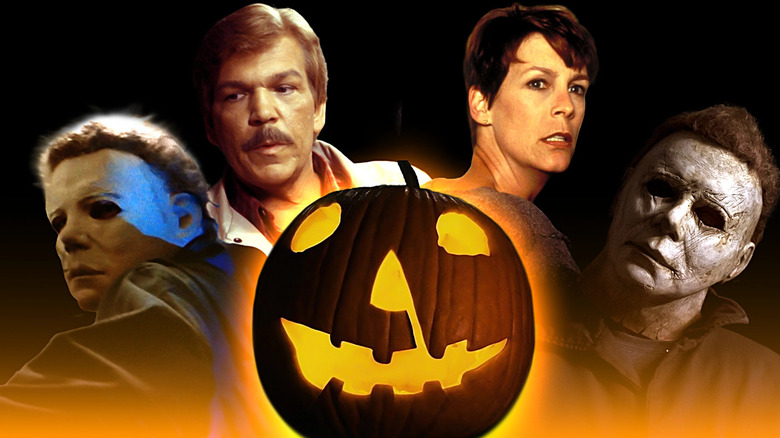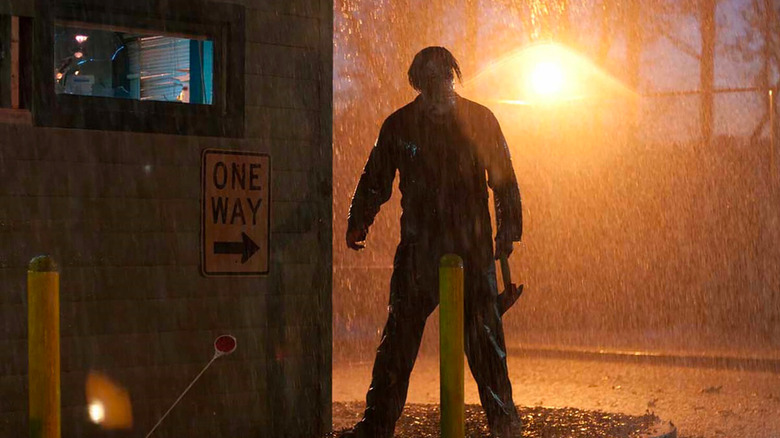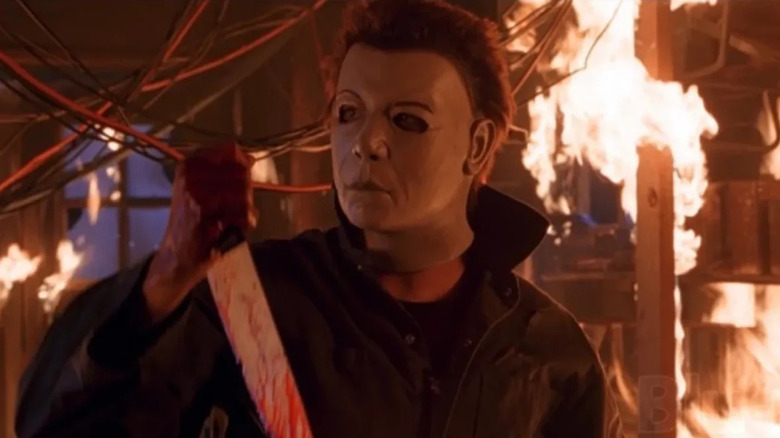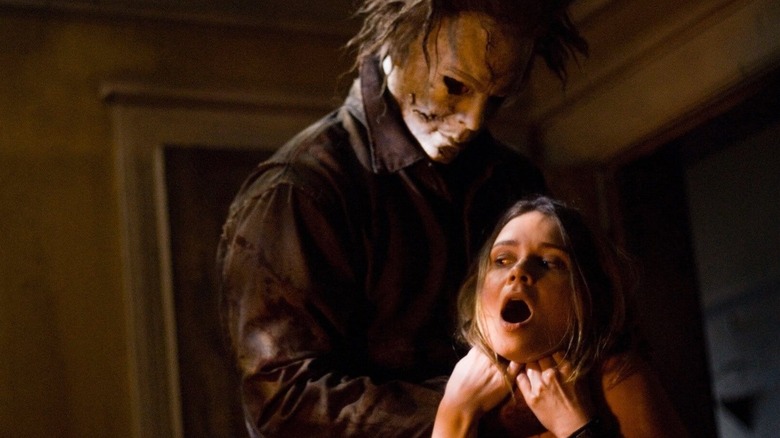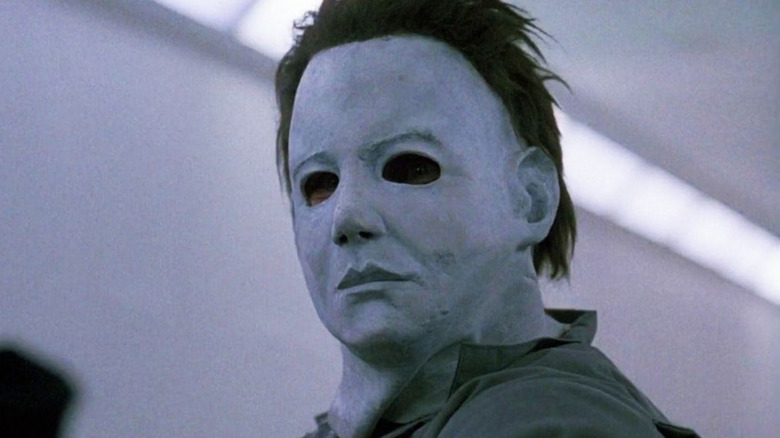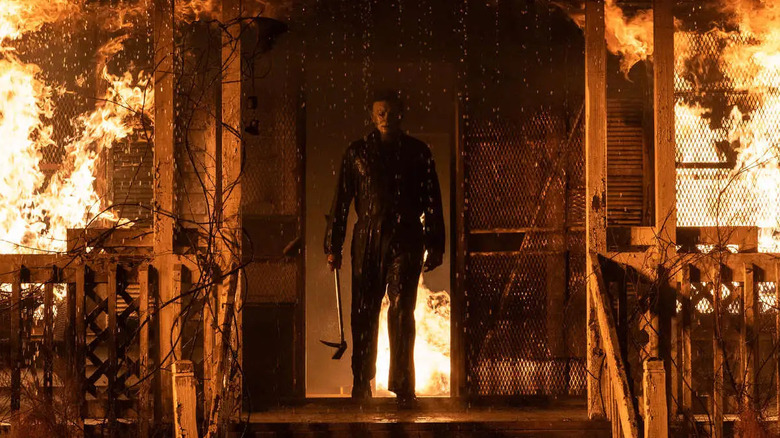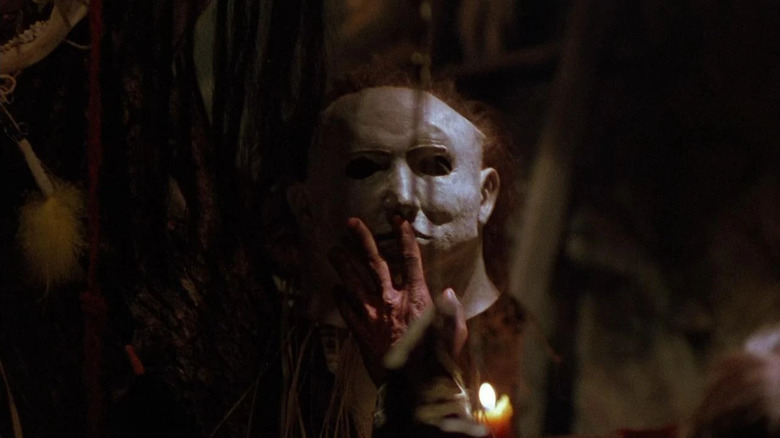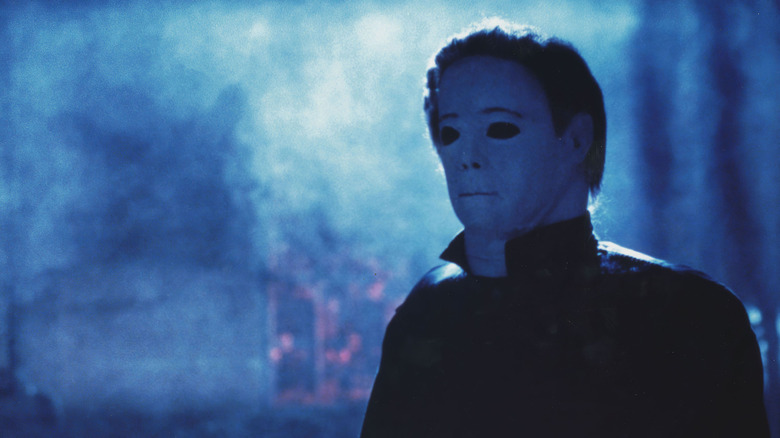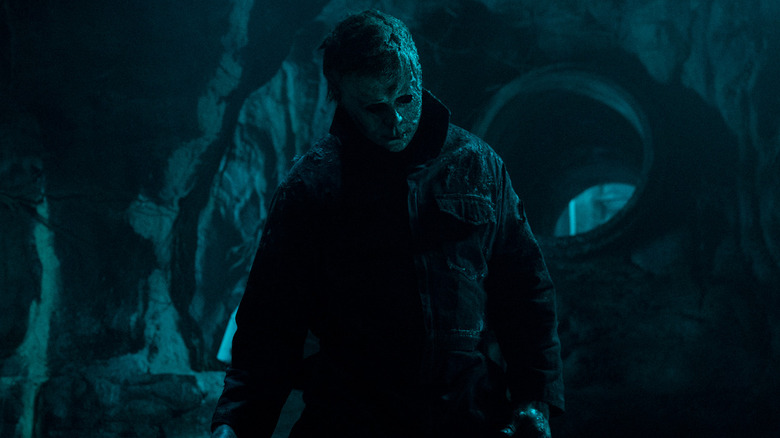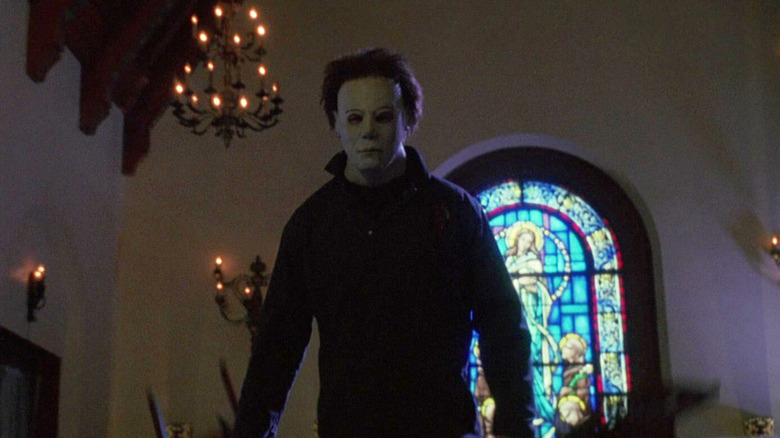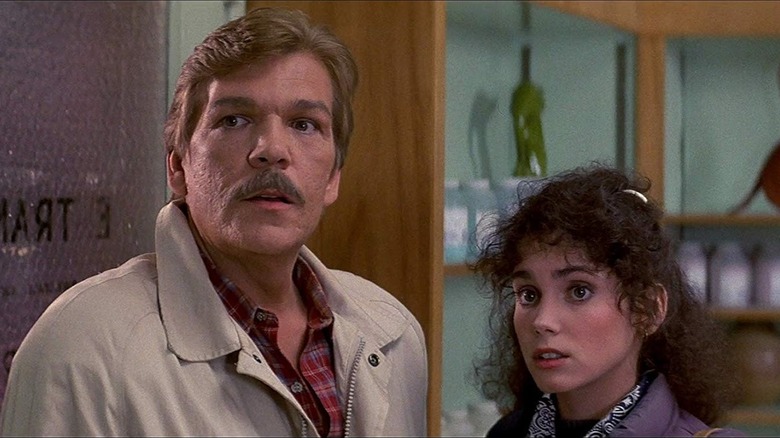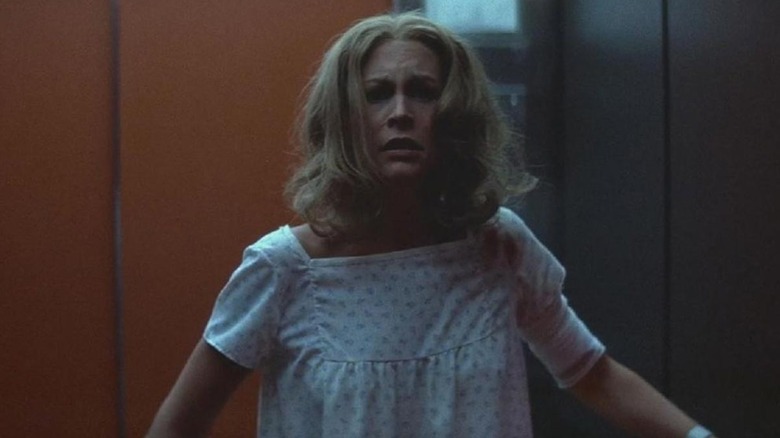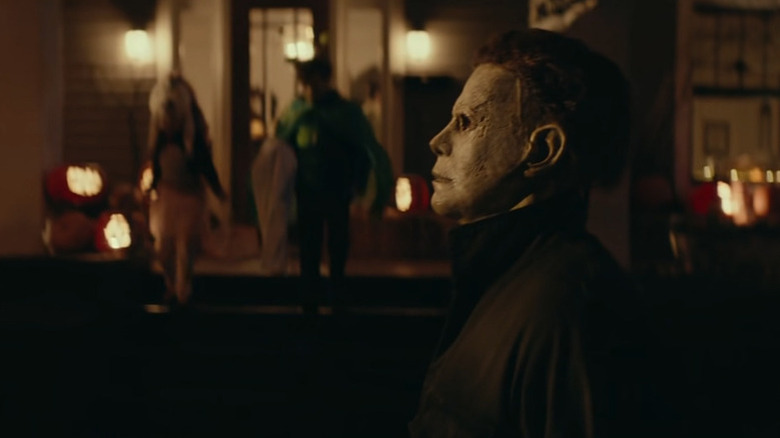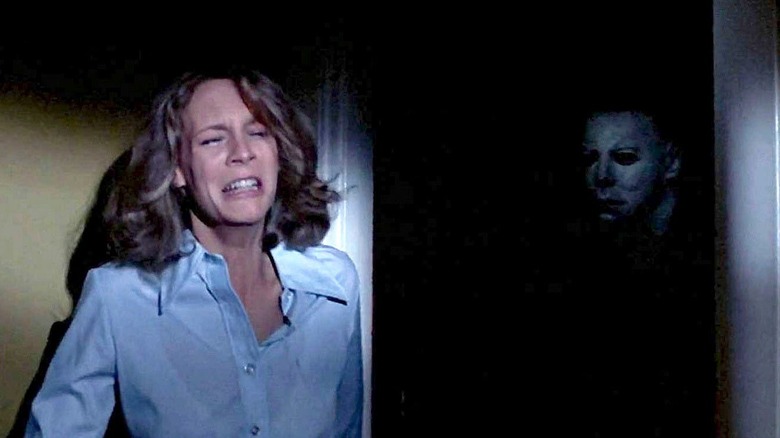All 13 Halloween Movies, Ranked From Worst To Best
While there were slasher movies before, no movie catapulted the horror sub-genre into the Hollywood mainstream more prominently than "Halloween." Created by filmmaker John Carpenter and co-writer and producer Debra Hill, the movie largely focuses on masked serial killer Michael Myers. The original 1978 film was an enormous success, popularizing slashers and kicking off its own multimedia franchise, including numerous sequels. Since then, the movie series has featured multiple reboots and timelines, repositioning the franchise for new generations.
Like virtually every horror franchise, "Halloween" has wildly diverged in its level of quality over the years, with triumphant highs and embarrassing lows. There are some genuine horror classics in this series, along with movies that should've been relegated to direct-to-video or dropped altogether. But even with the more questionable entries, the iconic legacy of "Halloween" is impossible to ignore and it remains one of the most influential horror franchises of all time. Here are all 13 "Halloween" movies, ranked from worst to best.
13. Halloween II (2009)
Though filmmaker Rob Zombie reportedly did not have a good time making his "Halloween" reboot, he returned to helm its 2009 sequel. Zombie's "Halloween II" ostensibly begins immediately after the 2007 movie, with Laurie Strode (Scout Taylor-Compton) recovering from her encounter with Michael Myers (Tyler Mane). After an admittedly scary prologue in Haddonfield Memorial Hospital, the movie segues into Laurie's deteriorating mental condition as she mirrors her brother's own murderous descent. This is exacerbated by the revelation that Michael survived his previous rampage and continues searching for Laurie to reunite with his long-lost sister.
Whereas Zombie largely maintained the overarching narrative beats to the original "Halloween" for the majority of his reboot, "Halloween II" is very much its own beast. The director's cut of "Halloween II" is one of the boldest takes on the franchise. Unfortunately, bold doesn't always guarantee improved quality. Simply put, Zombie's sequel is a strange beast, particularly with its bizarre recurring visions of Laurie and Michael seeing their mother with a white horse. A meditation on trauma and inherited evil, Zombie's "Halloween II" feels like a pretentious arthouse project in its better moments and an incomprehensible mess most of the time.
12. Halloween: Resurrection
Any good will and franchise momentum that "Halloween" received from its 1998 soft reboot/revival "Halloween H20" was squandered by its 2002 sequel "Halloween: Resurrection." The movie opens with Laurie Strode (Jamie Lee Curtis) confined to a sanitarium after mistakenly murdering a man Michael Myers (Brad Loree) disguised as himself to trick her. After dispensing with Laurie, Michael returns to Haddonfield where he discovers a reality show is being filmed and broadcast live online at his childhood home. Michael begins to pick off the cast and crew one-by-one, putting him on a collision course with the show's director Freddie Harris (Busta Rhymes).
With its contrived premise and laughably poor execution all around, "Halloween: Resurrection" is a movie that nearly killed the franchise. Conceptually, a livestream "Halloween" movie was ahead of its time, but handled so poorly that it all just feels like a cheap gimmick. The movie's inclusion of Busta Rhymes shouting down Michael Myers and beating him up with amateur martial arts makes the movie come off like a bad joke. "Halloween: Resurrection" is a sequel so bad that it tarnishes "H20" by proxy and leaves its revival timeline with nowhere to go.
11. Halloween (2007)
After the original Laurie Strode saga seemed to come to a definitive end with "Resurrection," Rob Zombie took the reins to reboot the "Halloween" franchise in 2007. The movie's first act delves into why Michael Myers (Daeg Faerch) killed his older sister as a child, while upping the body count in true Zombie fashion. Seventeen years after being institutionalized, Myers (Tyler Mane) escapes from a sanitarium and returns to his childhood home in Haddonfield. Myers begins stalking his now-teenage sister Laurie Strode (Scout Taylor-Compton) and her friends on Halloween, with Laurie initially unaware why Myers is interested in her.
The underlying problem with Zombie's reboot is that it both demystifies the franchise's central killer while also somehow failing to answer the questions it presents. In addition significantly increasing the number of kills from the 1978 original, Zombie brings his penchant for on-screen brutality as Myers obliterates victims with the intensity of a football linebacker. Zombie's 2007 "Halloween" reboot isn't a subtle movie, nor is it a particularly pleasant one, though it does have its fair share of vocal defenders. For better or worse, the reboot moved the franchise past the maligned "Resurrection," clumsily reintroducing the slasher property to a new generation.
10. Halloween: The Curse of Michael Myers
After a six-year hiatus, the "Halloween" franchise returned with 1995's "Halloween: The Curse of Michael Myers," concluding the story of Michael's niece Jamie Lloyd (J.C. Brandy). A pregnant Jamie escapes from the mysterious Cult of Thorn, which worships the pagan practices around Halloween and has Michael as their chosen killer. As the chase brings Jamie and Michael (George P. Wilbur) back to Haddonfield, an adult Tommy Doyle (Paul Rudd) and Sam Loomis (Donald Pleasence) become involved for a final showdown against Michael. Along the way, Michael menaces the surviving members of the Strode family, now living in his childhood home.
There are two different versions of "The Curse of Michael Myers," the theatrical and producer's cuts, and both iterations are garbage. The movie's big appeal is seeing Paul Rudd get his Hollywood start and longtime series actor Donald Pleasence's final appearance as Loomis. But ultimately, the story only works when it moves away from the Cult of Thorn plot points, which is evident with its nonsensical endings. There is a certain charm in watching the last movie in the franchise's original timeline, but it also exposes why reboots were needed in the first place.
9. Halloween Kills
After the franchise was completely reinvigorated by its 2018 "Halloween" soft reboot, the movie was followed by the 2021 sequel "Halloween Kills." Set immediately after the preceding movie, Michael Myers (James Jude Courtney) escapes the burning house Laurie Strode (Curtis) trapped him in. With Laurie recovering in a hospital from their latest confrontation and unable to stop him, Michael cuts a bloody swath as he makes his way back to his childhood home. Incensed that the killer that terrorized their community is on the loose again, the people of Haddonfield band together to form an impromptu mob to hunt him down.
Plenty of slasher sequels explore the trauma experienced by its surviving characters, with "Halloween Kills" expanding that theme to how that trauma affects an entire community. Filmmaker David Gordon Green escalates the brutal kills to fit that direction, but also loses the movie's focus and, frankly, our investment in the characters in doing so. On a conceptual level, the movie brings interesting ideas and questions to the table, but doesn't really provide substantial answers to them. A sequel that feels like it's spinning its wheels before setting up the revival trilogy's eventual finale, "Halloween Kills" fills the space with sadistic moments and pretentious pondering.
8. Halloween 5: The Revenge of Michael Myers
After the huge success of "Halloween 4," a direct sequel was fast-tracked into development and released less than a year later. 1989's "Halloween 5: The Revenge of Michael Myers" reveals that the titular slasher survived his bloody fate in the preceding film and spent a year recovering to renew his rampage. Michael (Don Shanks) resumes stalking his niece Jamie Lloyd (Danielle Harris), who has been recovering from her own trauma from her last encounter with her evil uncle. As Jamie's seemingly telepathic bond with Michael increases, she escapes the clinic where she's been confined to warn her friends of the killer's return.
A lot of the personality that distinguished the "Halloween" movies from its slasher contemporaries evaporates in this fifth installment, with even Michael's mask looking particularly shoddy. There are some solid kills and Harris does a good enough job as a returning Jamie, but the whole thing feels as noticeably rushed as its production. This extends to an abrupt and confusing ending, setting up the divisive Cult of Thorn storyline continued by its sequel. It was with "Halloween 5" that the franchise began to feel visibly stale, but at last one more stab at it was taken before a series reinvention.
7. Halloween 4: The Return of Michael Myers
After trying to change the franchise's direction by moving away from its established story and characters, "Halloween" returned to its roots for "Halloween 4: The Return of Michael Myers." The 1988 movie takes place 10 years after the first two films, revealing Michael (Wilbur) survived his fiery fate a decade prior. Emerging from a coma after learning he has a niece, Jamie Lloyd (Harris), Michael escapes and hunts Laurie Strode's daughter around Haddonfield. After attacking the local power station and police force, Michael proceeds to stalk Jamie and her friends around town as the community bands together to stop him.
"Halloween 4" reaffirmed the franchise as a slasher series, with no more deviations from that sub-genre or its lead killer moving forward. Since the 1978 original, the market was now flooded with slasher movies, but "Halloween 4" at least feels a cut above its contemporaries. If anything, the sequel maybe plays its genre beats a bit too safe, but maybe that was needed to reintroduce Michael as its unkillable antagonist. A solid return to form, "Halloween 4" is a no frills flick that wisely pivots to fan expectations.
6. Halloween Ends
The conclusion to David Gordon Green's revival, 2022's "Halloween Ends" is a very weird beast and an admitted departure from the rest of the reboot trilogy. Set four years after "Halloween Kills," the movie has Laurie Strode (Curtis) and her granddaughter Allyson (Andi Matichak) try to move on from Michael's 2018 rampage. This is juxtaposed by the introduction of Corey Cunningham (Rohan Campbell), a young man ostracized for accidentally killing a child, who strikes up a romance with Allyson. As Corey begins to lash out against his tormentors, he meets a weakened but still deadly Michael (Courtney), who spreads his evil influence to Corey.
Gently distancing itself from its immediate predecessor, "Halloween Ends" boasts the strongest performances from Curtis and Matichak as their respective characters. Similarly, the love story between Allyson and Corey offers a fresh and moody direction for the franchise, but one that feels more indebted to "Christine" than "Halloween." Franchise purists understandably thought the movie strayed too far from the formula the series is known for. But, despite its uneven execution, "Halloween Ends" is an underrated entry and subverts expectations about what "Halloween" should be.
5. Halloween H20: 20 Years Later
For its 20th anniversary, Jamie Lee Curtis returned to her star-making role as Laurie Strode for the franchise's first soft reboot "Halloween H20: 20 Years Later." The 1998 movie ignores all the sequels after "Halloween II," with a haunted Laurie living under a new identity in California and working at a private boarding school. Discovering where his sister has hidden from him, Michael Myers (Chris Durand) resurfaces to terrorize Laurie and her teenage son John (Josh Harnett). Trapped in her academy with John and their friends, Laurie decides to make her final stand to kill Michael once and for all.
After a line of sequels of steadily diminishing quality, "Halloween H20" restored the luster to the franchise and killed at the box office. Interestingly, the movie hasn't aged as well as several of its '80s predecessors, feeling more stylistically to "Scream" than "Halloween," a sign of changing genre tastes. Curtis brings her most magnetic performance as Laurie at that time, but the vibes just feel a bit off, something epitomized by Michael Myers' unforgivable mask in the movie. A significant improvement over the last slew of "Halloween" movies, "H20" successfully resurrected the franchise but is just short of being truly great.
4. Halloween III: Season of the Witch
With the Michael Myers story seemingly resolved in "Halloween II," the franchise attempted to venture into the anthology horror direction with a completely original and standalone tale moving forward. 1982's "Halloween III: Season of the Witch" distances itself from slasher material to blend science fiction and the supernatural for its narrative. Local physician Daniel Challis (Tom Atkins) is drawn into the machinations of toy company Silver Shamrock Novelties, which has produced a line of popular Halloween masks. Challis tries to stop company owner Conal Cochran (Dan O'Herlihy) and his androids from using the masks for an ancient ritual killing anyone wearing the mask during a coded broadcast.
"Halloween III" has always carried the baggage of its association with the slasher series without its usual villain. Separated from this, "Season of the Witch" is a solid '80s chiller with the franchise's darkest plot, with one of John Carpenter's most underrated musical scores. There are some who think "Halloween III" is the series' best sequel. I wouldn't go quite that far, but it is obviously the most original sequel while suffering from its title at the same time.
3. Halloween II (1981)
The only "Halloween" sequel that feels like an organic continuation, both aesthetically and narratively, is 1981's "Halloween II." Taking place directly after the first movie, Laurie Strode (Curtis) is taken to the hospital to recover from her ordeal against Michael Myers (Dick Warlock). Meanwhile, Dr. Loomis (Pleasence) finds evidence that Laurie is actually Michael's long-lost sister, explaining his unhealthy interest in her. As Loomis races to the hospital to protect Laurie, she and the hospital staff are hunted by Michael as he resumes his pursuit of her.
If there are any of the classic sequels that need a positive reappraisal at this point, it's the 1981 "Halloween II." Yes, even co-writer and producer John Carpenter had harsh opinions about the movie, but the sequel comes the closest to recapturing the original's charm. From the mounting suspense in the darkened hospital halls to Laurie memorably being chased by Michael in the movie's climax, there is a lot to love about this movie. After years of derision over its heightened violence and the lack of Carpenter's direction, it's time to recognize "Halloween II" as the franchise's definitive sequel.
2. Halloween (2018)
After the franchise sputtered out on multiple occasions across its history, filmmaker David Gordon Green gave it the shot in the arm it needed in time for its 40th anniversary. 2018's "Halloween" is another soft reboot to the franchise, this time ignoring all but the 1978 original movie. To cope with her trauma, Laurie Strode (Curtis) has since become a hardened survivalist, estranging her from the rest of her family. However, after Michael Myers (Courtney) escapes during an inmate transfer and terrorizes Haddonfield again, Laurie's lifestyle makes her the best-suited to stop him.
Arguably the most beautiful "Halloween" movie ever shot, the 2018 revival plays it safe by hewing close to the spirit of the original. Curtis clearly relishes the toughed-up take on Laurie while the movie's cinematography is a standout, particularly in a long take of Michael murderously prowling around Haddonfield. The revival also has Green masterfully mounting tension and bloody scares at a level he wouldn't achieve in either of his sequels, making Michael frightening again. A celebration of the franchise, Green put his best creative foot forward with the 2018 "Halloween" in its best revival to date.
1. Halloween (1978)
You knew that the 1978 movie that started it all was going to be towards the top of this list, if not its pinnacle. Director and co-writer John Carpenter and producer and co-writer Debra Hill create a slasher villain for the ages with Michael Myers (Nick Castle). Escaping custody, Michael returns to his hometown of Haddonfield, where he stalks high schooler Laurie Strode (Curtis) and her friends on Halloween night. Picking them off one-by-one, Michael sets his sights on Laurie as his psychiatrist Dr. Loomis (Pleasence) scours the neighborhood for his deadliest patient.
At its core, "Halloween" is a violent coming-of-age movie, with Laurie coming into her own to survive against Michael. Revisiting the movie, one of the best aspects of the film is its sense of restraint, letting the suspense steadily build before Michael inevitably cuts loose. From its deliberate pacing, memorable score, and unforgettable climax, the movie gels into an enduring horror masterpiece. Over 40 years later, no other slasher movie better defines or captures the genre's appeal than the original "Halloween."
